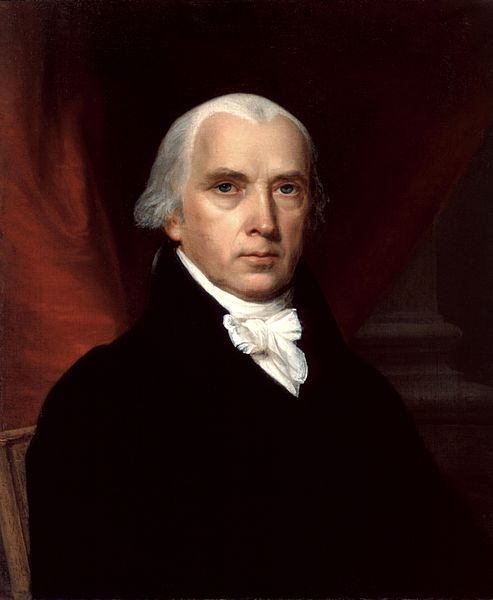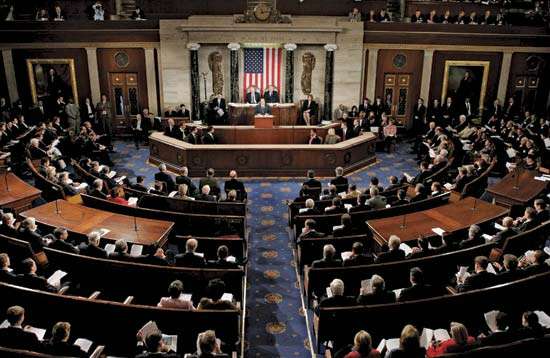Due Process Clause -
5th Amendment
The Due Process Clause of the 5th Amendment to the United StatesConstitution promises that no one can have their life, liberty or property taken away without Due Process. What is due process, exactly? In short, it means that people must be treated fairly in the legal system. This important 5th Amendment clause reads like this:
"No person shall... be deprived of life, liberty, or property, without due process of law."
History of the Due Process Clause
The basic idea known as due process as represented in the Due Process Clause finds its roots in the English document Magna Carta of 1215. This document first codified that the monarch must obey written laws or be punished by his subjects. Article 39 of Magna Carta says:
"No freemen shall be taken or imprisoned or disseised or exiled or in any way destroyed, nor will we go upon him nor send upon him, except by the lawful judgment of his peers or by the law of the land."
You can read the original Magna Carta of 1215 here.
Magna Carta was revised several times over the years. In a 1354 edition, the phrase "due process of law" was used for the first time. The 1354 edition put it this way:
"No man of what state or condition he be, shall be put out of his lands or tenements nor taken, nor disinherited, nor put to death, without he be brought to answer by due process of law."
The idea presented in both of these clauses, and repeated by the Founding Fathers in the Bill of Rights' Fifth Amendment, is that the government can only punish a person based on written laws. If the government officials were allowed to act according to their own will and make up any decisions they wanted, they could put people in prison who disagreed with them, or punish them in other ways.
This is how monarchies existed throughout all of history, until the concept of written constitutions came along. Monarchs could make up rules at will and no one would even know he was violating the monarch's will until he was pulled into court or thrown in prison. The monarch's will was absolute. With the development of written constitutions, this arbitrary and capricious punishing of people was greatly reduced and people were treated more fairly.
Due Process Clause in the United States
In the thirteen colonies, the terms "law of the land" and "due process" were pretty much used interchangeably. They referred to the fact that officials could only take away people's rights, goods, lands, life or freedom according to written and established laws. In short, the accused must be granted what is "due" him, meaning his right to have a fair legal process and not an arbitrary one created on the spot by the whims of the officials involved.
The principles embodied in the Due Process Clause were widely held by the time the 5th Amendment was added to the Constitution in the Bill of Rights. By this time, eight states already had due process clauses in their constitutions. As the states debated whether or not to ratify the Constitution, many people spoke out against it saying it did not protect individual rights strongly enough.
Members of the Anti-Federalist Party were persuaded to accept the Constitution on the condition that a Bill of Rights would be added to it in the First Congress. A Bill of Rights is a list of specifically defined rights that are guaranteed to the people. Consequently, many states sent Congress a list of suggested amendments to add into the Bill of Rights. You can read more about the Bill of Rights' purpose here.
The state of New York sent a proposed amendment dealing with the addition of a due process clause. New York's proposed amendment was worded like this:
"No Person ought to be taken imprisoned or disseised of his freehold, or be exiled or deprived of his Privileges, Franchises, Life, Liberty or Property but by due process of Law."
James Madison studied the various proposed amendments by the states and boiled them down to about twenty specific amendments that were the most widely accepted. On June 8, 1789, during the first session of the First Congress, he made a speech proposing the amendments to the Constitution. You can read Madison's complete June 8, 1789 speech here.
Madison reworded New York's proposal slightly in his proposed Due Process Clause. Remarkably, the Congress accepted this clause verbatim in Madison's own words. Nearly every other part of his proposals were debated and altered, some more than others. The fact that they didn't alter this one is probably an indication of how widely its principles were held. The Bill of Rights, including the 5th Amendment's Due Process Clause, was adopted by the States and formally became law on December 15, 1791.
Due Process Clause in everyday life
The Due Process Clause of the Fifth Amendment applies only to the Federal government. The entire Bill of Rights was a restriction upon actions of the federal government, not on state governments. So, originally, states could make laws regarding the various rights listed in the Bill of Rights, such as freedom of religion, freedom of speech and due process.
After the Civil War, the 14th Amendment was added to the Constitution, which included a Due Process Clause that was aimed specifically at the States. The intention of Congress was to prevent Southern States from discriminating against former slaves. In other words, former slaves were entitled to their due process of the law by virtue of their citizenship. You can read the 14th Amendment to the US Constitution here.
Eventually, through various Supreme Court decisions, almost all of the provisions in the Bill of Rights were incorporated against the states by using the 14th Amendment's Due Process Clause. This has led to a huge power shift from elected bodies to the judiciary. It is much more common today for unelected judges to make substantial decisions that affect millions of Americans than it was in the first 150 years of American history. You can read more about this issue of power being shifted from the elected legislatures to the Courts by reading our 9th Amendment article here.
The Due Process Clause applies to any legally identifiable entity such as a person, an organization, a state or a corporation, meaning that all of these entities can expect to be protected from arbitrary government actions against them.
The Due Process Clause also applies to all phases of a criminal proceeding starting with any pre-trial activities such as arrests, interrogations or depositions and goes through to the actual process of the trial and available appeals. This means that the government must strictly obey written laws regarding each of these procedures. Officials cannot just create the rules as they go or handle situations with criminal suspects however they choose. If they violate the written laws, they could be punished by law and any evidence found or judgment made against the suspect could be thrown out as an illegitimate violation of his rights.
Due Process Clause - Two types of due process
The Supreme Court has basically drawn out two distinctive types of due process from the Due Process Clause. They are procedural due process and substantive due process.
Procedural due process
Procedural due process refers to the actual process of legal proceedings. This means that parts of the process of enforcing the law such as arrests, interrogating suspects, informing defendants of the charges against them, jury selection, etc. all must be done according to certain written laws that are fair and clear.

Procedural due process dictates that if you are to be a part of any legal proceeding, you must be informed of the time, date and place that meetings are to take place. You must also be informed of any relevant information, such as charges against you, or paperwork that must be completed, so you can adequately prepare yourself. It wouldn't be fair for you to be tried in court and not find out what the charges were until the day of the trial! Procedural due process applies not just to legal actions of the government, but to administrative functions as well. Anytime you interact with the government, the officials must follow written and fair procedures.
Procedural due process also requires that each side is able to fully present his side of things, whether that is a complaint or a defense, or any other relevant information. The sides must also be able to present their information in front of an impartial judge or jury who will listen fairly to each side. Accused people also have a procedural due process right to confront their accuser.
Substantive due process
Substantive due process is a considerably different idea than procedural due process. Procedural due process refers to fair legal proceedings. Substantive due process refers to the actual content of the laws themselves. If the "substance" of the law itself is judged to be unconstitutional, then substantive due process has been violated.
Substantive due process has been used by the Court to allow abortion, for example. The Court decided, rightly or wrongly, that there is protection for a woman's right to have an abortion if she wants to in the Constitution, even though it is not specifically mentioned there.
There are some rights specifically spelled out in the Constitution. Everyone agrees that there is an innumerable list of other rights which are to be protected, even though they are not listed. This is the clear meaning of the Ninth Amendment, which reserves all rights not specifically given to the Federal government in the Constitution, to the States.
Generally everyone agrees that unlisted rights are to be protected, but not everyone agrees who is to determine what those rights are. Many people believe this choice was given to the state legislatures to define whether or not something is an unlisted right. Some believe that this is the Supreme Court's job. The Supreme Court does this through use of substantive due process. If the Court believes that a law passed by the government is not fair or somehow violates someone's rights, then they throw the law out.
Due Process Clause - It cuts both ways
So which is right? Should state legislatures or the Supreme Court decide which unlisted rights are protected and which aren't? Probably for every individual, some decisions would be made that they are in favor of and some against, no matter which made the decision.
In other words, if the States make these decisions, some of their decisions will go your way, but some won't. If the Court makes the decision, some of them will go your way, and others won't.
Some people with morally conservative views for example, believe the Supreme Court should not have allowed abortions. They think this was properly left to the states to decide. So this decision goes against their opinion. On the other hand, the same legislatures passed laws in many states requiring children to go to public schools. Many morally conservative people want to send their children to religious schools, or to home school them. The same Supreme Court that declared state laws banning abortions illegal, also declared the state laws requiring that children go to public school illegal. This means that parents can send their children to religious schools or home school them if they want to.
So some things will go for you and some against you, no matter who is making the final decision, but which would you prefer to make these decisions? You be the judge, is it right for 9 unelected people to make decisions for millions of people about what they can or can't do, or is it better to have a group of several dozen or a hundred or more citizens from your own state make these decisions? Which body will more closely represent your values, your state legislature, or the Supreme Court? What if the majority wants a particular law, but the Supreme Court says NO. These are some questions to think about.
Due Process Clause - What are "life, liberty and property?"
The Supreme Court has gained an enormous amount of power in the daily lives of Americans. It has done this by expanding the list of "rights" it finds in the Constitution. One way the Court has created more and more unlisted rights that it thinks should be protected is by defining "life, liberty, or property" in broader and broader terms. For the first 150 years of this nation, these ideas were defined by fairly narrow, understandable and straightforward definitions.
But in the last 50-60 years, especially with the period of government expansion that began with the New Deal reform programs, the ideas "life, liberty, or property" have come to be defined as "any interest whose loss would be grievous" as one commentator put it!
Basically the gigantic expansion of government since the New Deal began has given rise to the idea that certain government services are "rights" that people deserve. Such things as welfare checks, unemployment checks and drivers licenses fall into this category. Before, these things were looked at as privileges, not as rights.
The Court has found a right to privacy, a right to abortion and a right to same sex relations through its ever expanding "life, liberty, or property" definition. It should also be noted that even though the Court has used the Due Process Clause to greatly increase its power in the last several decades, all of the Court's justices have not agreed with the principle of substantive due process. Current Justices Scalia and Thomas have been outspoken against this principle.
Likewise, Justice Byron White said in his Bowers vs. Hardwick opinion:
"Nor are we inclined to take a more expansive view of our authority to discover new fundamental rights imbedded in the Due Process Clause. The Court is most vulnerable and comes nearest to illegitimacy when it deals with judge-made constitutional law having little or no cognizable roots in the language or design of the Constitution. That this is so was painfully demonstrated by the face-off between the Executive and the Court in the 1930's, which resulted in the repudiation of much of the substantive gloss that the Court had placed on the Due Process Clauses of the Fifth and Fourteenth Amendments. There should be, therefore, great resistance to expand the substantive reach of those Clauses, particularly if it requires redefining the category of rights deemed to be fundamental. Otherwise, the Judiciary necessarily takes to itself further authority to govern the country without express constitutional authority. The claimed right pressed on us today falls far short of overcoming this resistance."
You can read about several interesting and significant Fifth Amendment Court Cases dealing with the Due Process Clause here.
Other 5th Amendment clauses:
- Grand Jury Clause
- Grand Jury Exception Clause
- Double Jeopardy Clause
- Self-Incrimination Clause
- Eminent Domain Clause
Amendments:
- Preamble to the Bill of Rights
- Learn about the 1st Amendment here.
- Learn about the 2nd Amendment here.
- Learn about the 3rd Amendment here.
- Learn about the 4th Amendment here.
- Learn about the 5th Amendment here.
- Learn about the 6th Amendment here.
- Learn about the 7th Amendment here.
- Learn about the 8th Amendment here.
- Learn about the 9th Amendment here.
- Learn about the 10th Amendment here.
Learn more about the Bill of Rights with the following articles:
- Main Bill of Rights page.
- For a brief synopsis of the First Ten Amendments click here.
- Learn about the Purpose of the Bill of Rights here.
- Read about the History of the Bill of Rights here.
- Look at the Bill of Rights in Pictures here.
Last updated 8/7/12
Revolutionary War and Beyond Home
Like This Page?
© 2008 - 2022 Revolutionary-War-and-Beyond.com Dan & Jax Bubis

















Facebook Comments